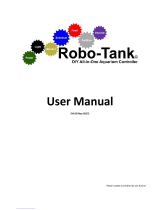
Red Sea’s Reef Mature Starter Kit
Introduction:
Red Sea’s Reef Mature Starter is a complete step by step program that prepares a new
marine aquarium for the long term success of an articial reef.
Typically the preparation process that is often called ‘cycling’ establishes a thriving colony
of aerobic nitrifying bacteria that convert the toxic waste products to nitrate. This program
however completes the biological maturation process by also establishing thriving
colonies of anoxic (de-nitrifying and phosphate harboring (PHB)) bacteria. Furthermore
the program provides the necessary conditions that will promote the growth of coralline
algae and other micro fauna found in live rock and within a sand bed.
The complete reef maturation program, which requires a period of 21 days, will result in
a fully matured system that will be biologically ready for stocking all animals including
delicate SPS corals.
This manual provides detailed daily instructions for implementing the program. A
detailed explanation of the biological processes in the maturation process and tips for
implementing the Reef Mature program can be found on Red Sea’s website.
Notes:
This kit includes all supplements you need to mature the system. Do not add any
other supplements or livestock (dead or alive) until advised to do so as part of the
program.
The Reef Mature program requires the use of accurate test kits for measuring pH,
KH, Ammonia, Nitrite and Nitrate. All of these tests with the appropriate level of
accuracy can be found in Red Sea’s Marine Care Test kit.



















